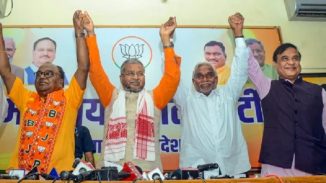Champai Soren joins BJP: Champai Soren, former Chief Minister of Jharkhand and senior leader of Jharkhand Mukti Morcha, expressed concern over the growing problem of Bangladeshi immigration in Jharkhand. Soren in his recent letter expressed his displeasure with the Hemant Soren government and other political parties, saying that the government is ignoring the important issues of identity and public security.
Champai believes that only the Bharatiya Janata Party under Prime Minister Narendra Modi and Home Minister Amit Shah can truly address the issue. Soren decided to join the BJP to protect the interests of the citizens of Jharkhand.
जोहार साथियों,
पिछले हफ्ते (18 अगस्त) एक पत्र द्वारा झारखंड समेत पूरे देश की जनता के सामने अपनी बात रखी थी। उसके बाद, मैं लगातार झारखंड की जनता से मिल कर, उनकी राय जानने का प्रयास करता रहा। कोल्हान क्षेत्र की जनता हर कदम पर मेरे साथ खड़ी रही, और उन्होंने ही सन्यास लेने का विकल्प…
— Champai Soren (@ChampaiSoren) August 27, 2024
These concerns were also raised by the High Court of Jharkhand, which raised serious questions about the governance and efficiency of the Jharkhand government of Hemant Soren, especially in the Santal Pargana region. The lack of decision-making and inadequate response to these critical issues not only reflects a lack of governance but also addresses the socio-economic and security implications of these issues for the country.
Concerns raised by the Jharkhand High Court The observations of the Jharkhand High Court during the hearing of the Public Interest Litigation (PIL) filed by Daniel Denmark highlight important issues that two: the integration of Bangladeshis in Jharkhand; The lack of information in the affidavits filed by deputy commissioners and police chiefs in six districts of Santal Pargana district prompted the court to question the legitimacy of the Hemant Soren government’s efforts to address at issue.
The court expressed its dismay at the lack of concrete data and explanations in the affidavit on Bangladeshi integration. This lack of understanding reflects a lack of governance but also raises concerns about the government’s ability to protect indigenous peoples. Failure to take into account the declining tribal population adds to these concerns and the perception that the rights and interests of tribal communities in Jharkhand are being ignored. The apex court sought an explanation and fixed the next hearing on September 5, seeking all documents from the authorities regarding the processing of Aadhaar and voter ID cards.
The influx of illegal immigrants from Bengal has greatly affected the socio-economic and cultural conditions of Jharkhand. Inaccessibility of people may strain public resources such as health, education and employment services, which are already in short supply in the state. Under Hemant Soren’s administration, effective strategies for managing these pressures appear to be less effective, which may exacerbate poverty and unemployment, thus adversely affecting the ethnic population of the area. Indigenous peoples may compete with illegal immigrants for scarce resources and jobs, reflecting the government’s failure to prioritize the well-being of Indigenous peoples.
As a rule, it creates problems and disrupts the life of immigrants in a country. Jharkhand has a rich cultural heritage but may lose its cultural identity due to demographic changes that will make it different from the rest. This can prevent cultural conflicts and feelings of alienation among Aboriginal people. The government’s inability to address these cultural impacts shows a lack of awareness and respect for the heritage of the people of Jharkhand.
Politics and Demographic Change The political implications of accession to Bangladesh are of equal concern. The increasing number of illegal immigrants may change the voting patterns and affect the political landscape of Jharkhand. The top court has pointed out the courts in the process of validating voters in the Santal Pargana region, where a large increase in voter turnout in some Muslim-majority areas has raised questions about the right of election process. These demographic changes can influence election outcomes, potentially leading to political instability and the marginalization of ethnic communities. The Hemant Soren government has not provided a clear explanation or remedial action for these violations, raising concerns about its commitment to democracy.
Security Issues From a security perspective, illegal access is a major threat. The presence of undocumented immigrants complicates the efforts of law enforcement officials to maintain safety and order. In addition, it increases the risk of anti-government activities, including weapons and drug trafficking and possible infiltration by insurgents. This threat is particularly important given the history of Naxalite violence in Jharkhand, which has exploited local grievances, and is likely to be exacerbated by the illegal influx of illegal immigrants. The current government under the leadership of Hemant Soren is not urgent to address these security problems which will have a negative impact on the stability and security of the country.
It is important to implement a comprehensive identification and verification system. Discrepancies in the processing of Aadhaar and voter ID cards need to be addressed to ensure that only legal residents have access to these documents. Regular audits and verifications should be carried out and strict measures should be taken to prevent the issuance of false identity documents. Legal and regulatory accountability Ensuring legal and regulatory accountability is important. The high court expressed concern over the lack of information in the affidavits submitted by local officials, and expressed the need for greater transparency and accountability.
The lack of accountability under the leadership of Hemant Soren led to increased distrust in the government’s ability to address issues of national concern. Bottom Line The problem of Bangladeshi immigration to Jharkhand is a complex challenge that requires a multifaceted approach. The concerns raised by the Jharkhand High Court and the warning issued by Champai Soren highlight the gravity of the situation and the need for urgent action.


